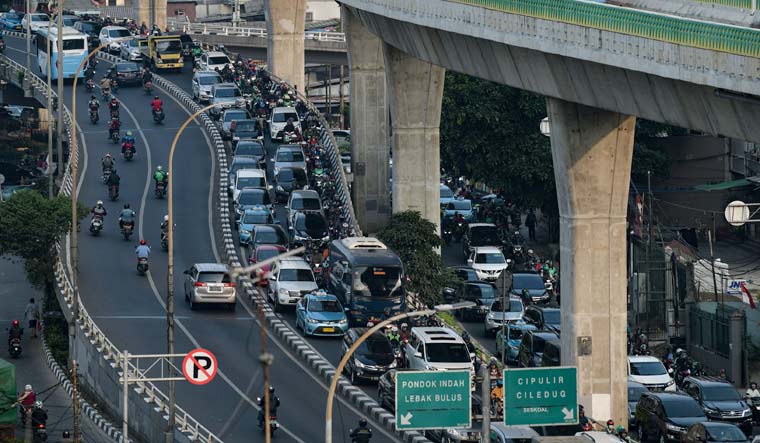Your cab has arrived, said the app. We waited for 10 more minutes before the Toyota crawled towards us. Traffic in Jakarta, as the internet had told us before reaching, moves at snail’s pace. A sleepy snail at that.
In fact, so bad was the situation that it spawned a huge ride-hailing revolution based on motorcycles. Imagine Uber, but with bikes. There is also the system of hiring policemen to help you navigate the traffic. You pay about $200 per cop, and they surround your vehicle on bikes and make way for you to move ahead. It’s an option for emergency situations. Such is the traffic condition.
also read
- Asian Para Games: Sumit Antil wins javelin gold, breaks own world record
- Indians sweep all medals in two events to begin Para Asian Games campaign in style
- 'Bridge is antithesis of gambling': Asian Games silver medallist Jaggy Shivdasani
- Asian Games hockey: Indian women beat defending champions Japan to win bronze
- Asian Games chess: India men and women settle for silver
Our cabbie, though, said things had improved. The odd-even system was being implemented, and had been expanded to more regions to smoothen traffic for the Asian Games.
Arvind Kejriwal would be proud, I thought.
“So, do people follow it?” I asked Priadi, our driver. He smiled sheepishly, saying yes, but meaning “not really”. One of the Indians we had met earlier said that those who could would buy two cars, one odd one even, to counter the rule. We ourselves had seen a few even numbers on an odd day, not to our surprise. We were used to people breaking traffic rules back home. Priadi, however, was not a rule breaker. He couldn’t be, as taxis are exempt from the rule.
The odd-even system, which allows only vehicles with odd-numbered licence plates to use major roads during rush hour on odd dates, and vice versa, had somewhat eased the load on the road. However, to an outsider, it was all still a big mess.
Such a mess, in fact, that the government had previously introduced many a scheme to curb the 'macet', the Bahasa word for traffic jam. One of which was the three-in-one policy, which meant that only vehicles carrying at least three people would be allowed to use the major roads during morning and evening rush hour. It was deemed ineffective, and was repealed last year, partly because of an innovative fix motorists had found.
Apparently, people were hired to sit in cars for the rule-bound stretch of the roads. Men and women on hire, often with children in tow, would wait at the mouths of the major roads, a hand raised to signal their availability. They would then be picked up by motorists and dropped off once the road ended. This way, the motorists could bypass the law and the “passengers”, called jockeys, would be paid accordingly for their efforts.
And here we thought Indians were good at bending the rules.


